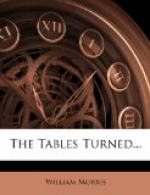A Voice. You can bear her troubles well enough, can’t you, old fat guts?
J. N. (scarcely articulate with rage). Officer! officer! arrest that man, or I will arrest you!
[USHER again makes a vain attempt to get hold of some one.
J. N. (puffing and blowing with offended dignity). Woman, woman, have you anything more to say?
M. P. Not a word. Do what you will with me. I don’t care.
J. N. (impressively). Gentlemen of Jury, simple as this case seems, it is a most important one under the present condition of discontent which afflicts this country, and of which we have had such grievous manifestations in this Court to-day. This is not a common theft, gentlemen—if indeed a theft has been committed—it is a revolutionary theft, based on the claim on the part of those who happen unfortunately to be starving, to help themselves at the expense of their more fortunate, and probably—I may say certainly—more meritorious countrymen. I do not indeed go so far as to say that this woman is in collusion with those ferocious ruffians who have made these sacred precincts of justice ring with their ribald and threatening scoff’s. But the persistence of these riotous interruptions, and the ease with which their perpetrators have evaded arrest, have produced a strange impression in my mind. (Very impressively.) However, gentlemen, that impression I do not ask you to share; on the contrary, I warn you against it, just as I warn you against being moved by the false sentiment uttered by this woman, tinged as it was by the most revolutionary—nay, the most bloodthirsty feeling. Dismiss all these non-essentials from your minds, gentlemen, and consider the evidence only; and show this mistaken woman the true majesty of English Law by acquitting her—if you are not satisfied with the abundant, clear, and obviously unbiassed evidence, put before you with that terseness and simplicity of diction which distinguishes our noble civil force. The case is so free from intricacy, gentlemen, that I need not call your attention to any of the details of that evidence. You must either accept it as a whole and bring in a verdict of guilty, or your verdict must be one which would be tantamount to accusing the sergeant and constables of wilful and corrupt perjury; and I may add, wanton perjury; as there could be no possible reason for these officers departing from the strict line of truth. Gentlemen I leave you to your deliberations.
Foreman of Jury. My lord, we have already made up our minds. Your lordship need not leave the Court: we find the woman guilty.
J. N. (gravely nodding his head). It now remains for me to give sentence. Prisoner at the bar, you have been convicted by a jury of your countrymen—
A Voice. That’s a lie! You convicted her: you were judge and jury both.




